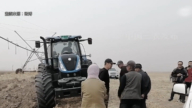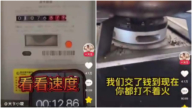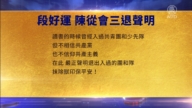【新唐人2013年10月07日訊】在中國大陸,網民們把從事網絡監控的人稱為五毛,網路特工,或網警。然而,隨著中共對網絡管控的深入,當局將重新對這200萬大監控大軍進行培訓,培訓後,部分考核優秀者,將獲得網路輿情分析師證明和從業憑證,從此成為官方認可的新職業。請看報導。
據大陸媒體報導,10月14號至10月18號,《人民網》輿情監測室將舉行首期「輿情分析師」培訓,培訓包括﹕輿情分析和研判方法、輿情危機處理與應對等8門課程。考試合格者,將獲得網路「輿情分析師」的身份證明和從業憑證。
報導指出,中國約有200多萬人,從事網絡輿情分析師工作,這些人分佈在中共黨政宣傳部門、和商業網站機構等。
另外,喉舌媒體《新華網》每個月也會舉行一次政、企網絡輿情培訓班,主要針對黨政領導幹部和企業的高官。
中共此舉,被看做是試圖控制網絡的又一項「大動作」。
德國之聲《北京觀察》欄目特約作者劉逸明:「我認為做這種培訓,根本目地就是要監視網民,控制網絡輿論,從而達到維護其專制統治的目地。」
大陸人士認為,網絡輿情分析師,實際上是網絡評論員的升級版。因為隨著網絡技術的發展,「五毛」起的作用越來越小了,中共為了應對輿論,為了營造官方的輿論環境,就建立了所謂的「輿情分析師」。
大陸人士張先生:「如果他真的重視民眾的輿情、輿論,他就不會說是在網上設那麼多敏感詞、每天那麼多人刪貼,還鼓動網民舉報非法信息啊,也不會設置網絡防火牆了。」
《法國國際廣播電臺》引述《法新社》的報導說,中共還使用不計其數的「網評人」,在社交網路上,偷偷摸摸的發表符合黨的思想的評論,他們的目地是為了「引導輿論」。確切而言,民間所說的「五毛」通常指的是這些人。
從相關報導看出,「輿情分析師」也有幾種,小縣城的「網路監視員」工作比較簡單,只要在百度,天涯,微博等網站,打上本縣的名字,看看網民對本縣說了甚麼「壞話」,然後把「情況」交給縣委領導。
輿情監測師,則屬於高級的一種,使用應用「網路爬蟲」技術的輿情監測高級軟件,「後臺有上千個處理器,還能監測到國外網站信息」。
而普通的「輿情分析師」的工作,主要就是每天坐在電腦前,在軟體裡輸入客戶設定的關鍵字,收集網民的觀點和態度,整理成報告,遞交給決策者。
他們上報的形式分成三類,有每週週報、每日短信報、每日書面報。
大陸人士張先生表示,現在的網絡舉報,讓落馬的官員越來越多,各級官員急需提前知道「輿情」,需要提前給媒體放風、提前接洽當事人等,因此對「輿情監測」也越來越要求「及時」。
張先生:「我在網上發一篇帖子揭露一個事,藉著搞活動的機會作弊斂財。然後我發帖的當天,市委宣傳部的就有人和我聯繫,要給我卡上打錢,讓我帖子刪掉。」
張先生表示,在收買無效後,他們就提前把網絡上的服務都關掉了。
業內還有一些聲稱可以全網消除負面輿情的非專業輿情分析師,這些公司聲稱可以全網24小時監控負面訊息,然後第一時間刪除。
據一家以新聞門戶網站為依託的輿情分析公司透露,與他們合作的不乏中央部委。
劉逸明:「表面上看,似乎在一段時間之內確實可能為中共的專制統治保駕護航,但是長久而言,對國家、對民眾、對中共自己是有百害而無一利的。因為這是一種倒行逆施的行為。」
自由撰稿人劉逸明認為,要想國家長治久安,必須像台灣那樣,啟動政治民主化。
採訪/陳漢 編輯/宋風 後製/李智遠
Two Million “50-Cent Members” Compete For Public Opinion Analyst Positions
In China, the 50-Cent Party refers to Internet commentators
hired by the regime to post comments in an attempt to shape
public opinion, i.e. online police, online spies.
As the Chinese Communist Party (CCP) strengthens Internet
control, they will hold analyst training courses for 2 million 50-Cent members.
Then they will select outstanding members and give them
certificates and jobs as online public opinion analysts.
The work becomes official recognition.
Chinese media reported that from October 14 to 18,
People’s Daily will launch its first analyst training class.
The eight subjects include analyzing public opinion,
assessment, management and response.
Successful candidates will receive a certificate
and a job license.
Reports said that there were two million 50-Cent members
working as public opinion analysts.
They are in the CCP’s propaganda departments,
commercial website industries and so on.
In addition, Xinhua News Agency holds monthly training
courses in political and business public opinion
for cadres and senior managers in enterprises.
The CCP’s move was said to be another round
of intensified online control.
Liu Yiming, a column writer for Deutsche Welle:
“I think its training purpose is to monitor netizens activities,
to control public opinion, and maintain
their authoritarian rule.”
Chinese people say that online public opinion analysts
are actually an upgraded version of online commentators.
Because with development of online technology,
50-Cent members played less and less significant roles.
In order to deal with public opinion and to create
an environment of official opinion,
the CCP launched online “public opinion analysts.”
Mr. Zhang in Mailand China: “If the CCP really cares about
public opinion, it would not be necessary to list
and delete millions of censored words each day.
It is not necessary to encourage netizens to report harmful
online information, or have a firewall.”
Radio France Internationale cited Agence France Presse who
said the CCP hired millions of online commentators to post
comments favorable towards party policies in an attempt
to shape and sway public opinion on Internet message boards.
They are the 50-Centy Party that netizens refer to.
Related reports said that there were a few kinds of analysts.
In a small county, the online monitoring job is simple,
they just need to type their county’s name into Baidu,
Tianya, Weibo etc, check what local netizens had posted,
then they submit the information to county leaders.
Public opinion monitor analysts’ jobs are high-level.
They use “web crawler” to systematically browse and update
contents or indexes of the world wide web.
General public opinion analysts sit in front of a computer
every day, entering keywords set by the “customer.”
They collect and report on views and attitudes of netizens.
They use three ways to submit reports; weekly reports,
daily text messages, and daily printed reports.
Mr. Zhang said the online reports result in many
corrupt officials being arrested.
Officials now want to know the public opinion earlier,
and be able to inform media and contact related officials
in advance.
Thus the public opinion information is needed “on time.”
Mr. Zhang: “Once I exposed an event about its embezzlement
of public donations.
On the same day I posted messages, the city propaganda
department contacted me, saying that they would
add money into my user account if I delete the posts.”
Mr. Zhang said that after he refused them,
they closed the online server sooner.
Some unprofessional public opinion analysts claimed
they could completely delete “negative public opinion.”
They said they could monitor “negative public opinion”
24 hours a day, then delete them on time.
According to a company that provides such a service,
their customers include central ministry departments.
Liu Yiming: “On the surface, it could work for a short time
to maintain the dictatorship power.
In the long-term, it is no good for the nation nor
for the people, it is even no good for the CCP itself.
It goes against the historical trend.”
Liu Yiming also said that to achieve stability, the state
must launch a democratic system like that of Taiwan.



























